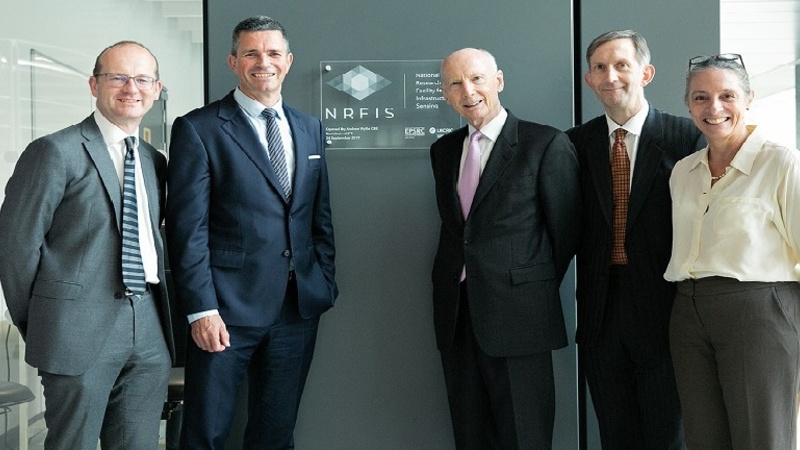
Representatives from industry, academia and policy attended the official opening of the new Civil Engineering Building on Tuesday 24 September. The £36 million collaborative space for the civil engineering industry to work alongside leading researchers from the University incorporates the UK Collaboratorium for Research in Infrastructure and Cities (UKCRIC) National Research Facility for Infrastructure Sensing (NRFIS).
Welcoming visitors to the new facility, Professor Simon Guest, Head of Civil Engineering, said: “The opening of NRFIS demonstrates the commitment of UKCRIC and the University of Cambridge to research in Civil Engineering, and our wish to collaborate widely with industry and other academic institutions to develop solutions to the world's most pressing problems.”
Attendees gathered on the strong floor of the Civil Engineering Building for the formal opening of the new facilities, located on the West Campus site of the University of Cambridge, and speeches by Andrew Wyllie CBE, President of the Institution of Civil Engineers (ICE), Professor Lord Robert Mair, Head of the Centre for Smart Infrastructure and Construction (CSIC), and Professor Richard Prager, Head of the Department of Engineering, University of Cambridge.
Andrew Wyllie acknowledged the timely contribution the world-leading research and state-of-the-art facilities will make in driving the emerging digital era of civil engineering. He said:
“We are living in a new era for civil engineering defined by the Fourth Industrial Revolution that is shaped by technology. The University of Cambridge is at the very forefront of this revolution characterised by the expertise and facilities we are celebrating here today. The research taking place within this state-of-the-art new building will support the UK as a global leader of smart infrastructure, data analytics and asset management.”
Tours of the new building, designed by Grimshaw Architects and underpinned by sustainability and future-proofing, showcased the 12 world-class, high-tech laboratories designed for a range of civil engineering disciplines including sensor development, structures, geomechanics and construction. These collaborative facilities are open and available to industry and all academic institutions and centres to support delivery of interconnected, integrated, and interdisciplinary research for UK infrastructure.
Professor Richard Prager highlighted the strategic initiative behind the new Civil Engineering Building. He said: “This is the first building that starts the University’s long-term strategic initiative to draw together the whole of engineering to reintegrate ourselves on this site.”
Professor Prager highlighted innovations designed to enable future growth and adaptation of the Civil Engineering Building as the process of reintegration grows, including expansion-friendly cladding, reusable concrete floor ‘planks’ and a bolted steel frame. The building is also instrumented with six sensor packages from the roof to the foundations: “This is the first University of Cambridge building making use of the Energy Cost Metric, a sustainability initiative that could only be achieved through a genuine collaboration between academics across a range of disciplines and the various professional consultants and builders on the project. We had to find a way to work together and this has substantially affected the design of the building leaving us with practical and sustainable ways to inform our future designs as we move the rest of the Department of Engineering to the West Campus site.”
Professor Lord Robert Mair reflected on the new research facility building on the University’s track record of delivering innovative sensor advancements through its Centre for Smart Infrastructure and Construction (CSIC). Lord Mair brought focus to the background to NRFIS, part of the UKCRIC portfolio of research and innovation facilities, pioneered by Professor Brian Collins of UCL to provide leadership for the development and growth of a coordinated and coherent world-class, UK-based international infrastructure research community. The new Civil Engineering Building is funded through the Engineering and Physical Sciences Research Council (EPSRC), as part of a £138M UK Government investment in infrastructure and cities research (part of the UKCRIC network).
“The opening of NRFIS at the new Civil Engineering Building is an important step to help us design, build and maintain infrastructure which is better, resilient, adaptable and sustainable. NRFIS is a facility where academia and industry can engage in protecting and growing the country’s infrastructure base and supporting the UK to be a leader in the field of smart infrastructure.
“UKCRIC’s evolving missions are designed to facilitate the delivery of interconnected, integrated and multidisciplinary research programmes and projects. NRFIS will be used to support research in the application of advanced sensor technologies to the monitoring of the UK’s existing and future infrastructure. More advanced sensors and appropriate data analysis will ensure better product quality, enhanced construction safety and smarter asset management.
“The UK needs to do more to invest in infrastructure and its associated services which are so important to the citizens using it every day. We welcome NRFIS and the new Civil Engineering Building which will help to improve, protect and grow the UK infrastructure base.”
Professor Giulia Viggiani, NRFIS Academic Lead, brought the event to a close: “NRFIS represents the commitment by the University of Cambridge to the UKCRIC mission of engaging stakeholders to better understand and address complex infrastructure challenges through collaborative research. We thank you all for joining us to mark the opening of this significant contribution to the UK infrastructure research community and look forward to collaborating with you in the future.”
• The NRFIS team is available to provide more information and to discuss collaborating on infrastructure research or using the new Civil Engineering Building facilities. For details email: enquiries@nrfis.cam.ac.uk
